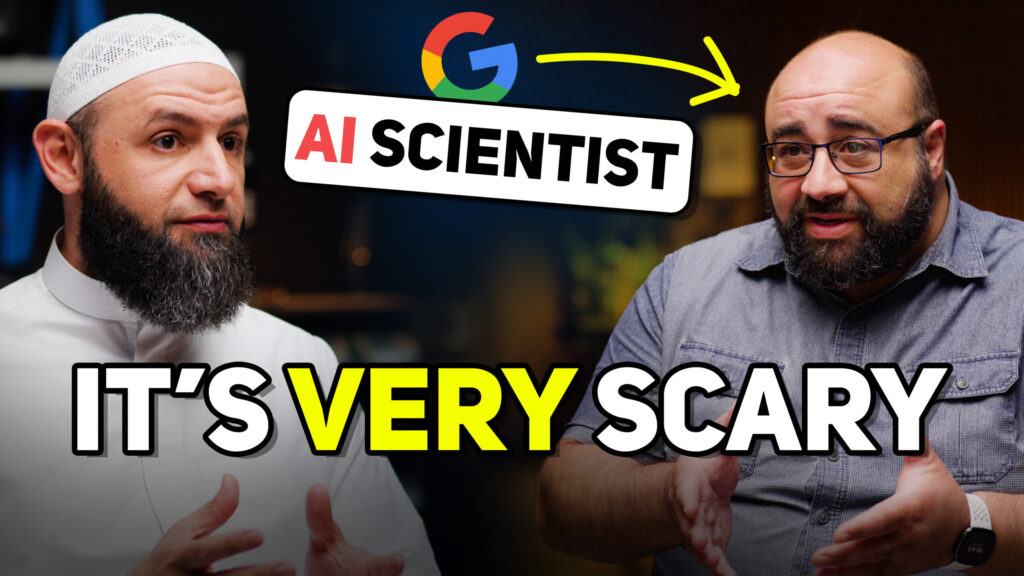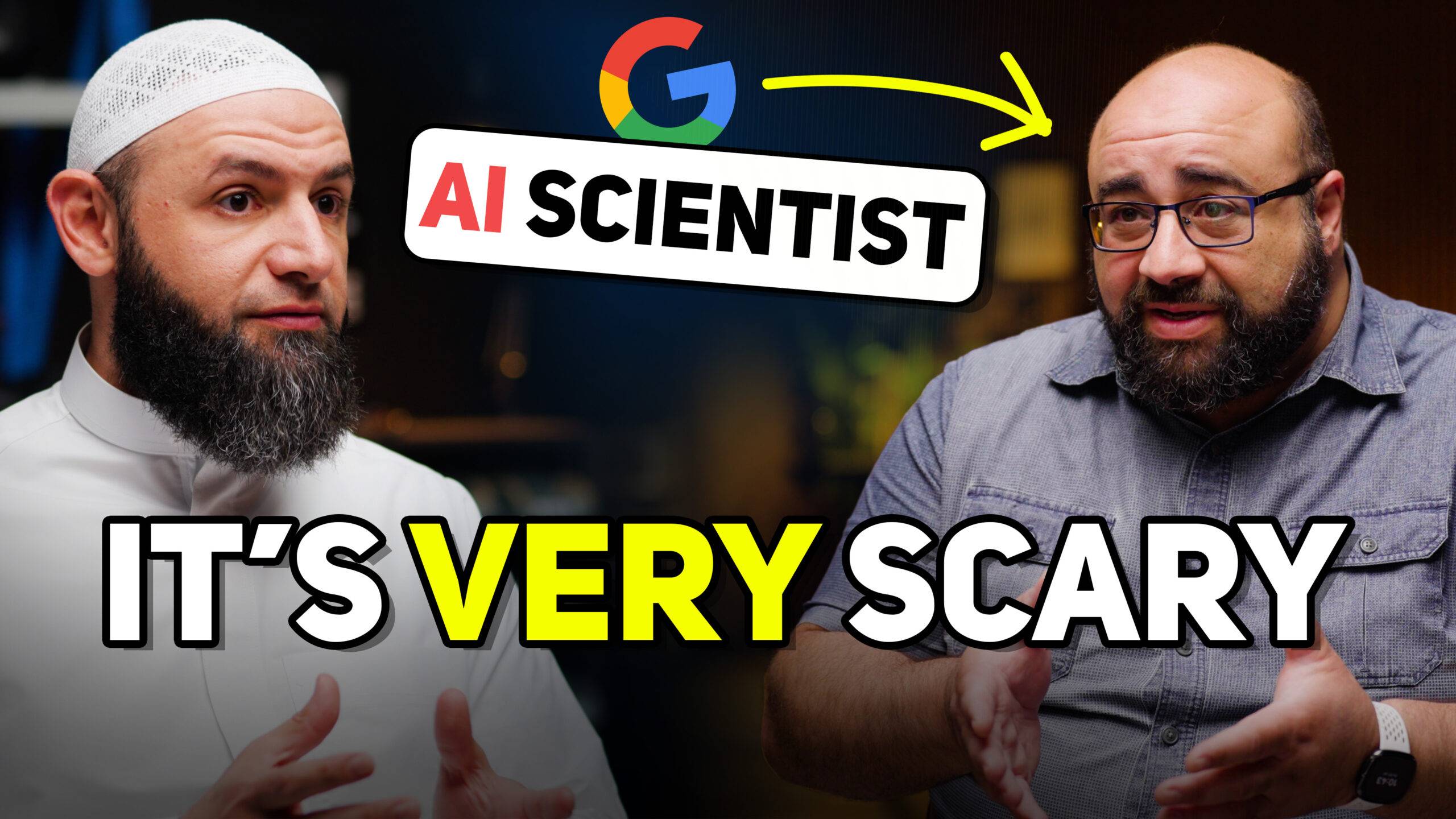Islam is obviously not exempt from the effects of artificial intelligence, which are rapidly taking over. The “A.I. revolution” is causing everything from language learning to picture creation to voice modeling to go viral.

Introduction – Why AI is Harmful for Muslims?
We have officially entered the AI Revolution, and in the last year alone, we’ve seen exactly how powerful AI can be with viral AI language systems such as chat GPT being used to order entire essays, complete school assignments, and even prepare Friday hardware or image generation software that can create realistic images and videos based on prompts from your wildest imagination.
Donald Trump as a Muslim?
Thank you, thank you very much, or even create for you a virtual studio. And of course, AI voice models that can be trained to replicate famous voices and mimic whatever sound you envision Kanye West singing in the shed. The crazy part is this technology is making mammoth progress by the day. But what does this mean for us as Muslims? Should we be scared? Is this a sign of an approaching apocalyptic doomsday, or is this something that will pass over us silently and soon wither away?
We sat down with one of the world’s leading Muslim experts in AI, Dr. Walid, no stranger to Silicon Valley and someone responsible for incorporating artificial intelligence into some of the world’s biggest brands such as Google and Uber, someone responsible for pioneering Google Maps. We asked him all the difficult questions, and this is what took place. Is there a transhuman agenda at play, a movement to merge humans and robots? Yeah, I mean, before we jump to the interview (which I’m sure you’re waiting to hear), if you enjoy this content and all the other content that OnePass Network produces, please support us in creating more. We are currently in the final stages of completing our studio to create bigger and better productions to benefit Muslims around the world. Please consider going over to our website and continue attributing whatever you can to support our mission. And now to the interview.
What is A.I?
So, you’ve been working with AI for decades. We often hear AI this, AI that. Yeah, what is artificial intelligence? I mean, how would you explain AI to a 10-year-old child? Yeah, so artificial intelligence historically, how computers have been programmed is you tell them to do A and B and C, and no matter what they experience or what things they see, they don’t change their behavior over time. The essence of artificial intelligence is learning from experience. In other words, every time the algorithm or the computer sees a new example, it’s trying to work out what can this example teach me about the world. Throughout our lives, we use AI a lot.
For example, when you finish watching a video on Netflix, how does it decide what you should watch next? The AI has been looking; at people who watched movie A always like movie B, or they, you know, 50 percent of them like movie B, and so on. So, in so doing, you’re starting to notice patterns in the world. No longer is the computer being told exactly what to do, but it’s being told to adapt and modify. And that idea of adaptation is something that historically has been something that only humans do, and now all of a sudden, computers are becoming stronger at it as well.
How difficult is it to Authenticate A.I.?
Given that AI at the moment can generate realistic images, text, video, and speech, Yeah, I think it is, especially what we’ve seen, for example, in the United States with interference in elections by Russians trying to use these techniques.
Imagine those techniques on steroids, right?
Because now you can personalize it for every person. The detectability is difficult, so it’s something we definitely have to pay attention to and hopefully regulate. How do you feel like this will cause the spread of information and false news and things like that? How can we combat this?
Yeah, it’s a really difficult problem. And I think it’s also because people have not yet learned to differentiate between artificial content and genuine content. And the content is designed to press people’s buttons, and that leads to things like confirmation bias. So really, it’s up to us to check our sources. And it’s not like this is an unIslamic thing; you know, Allah says so. Allah is telling us that when news comes to us, make sure to take the time to verify that. And those forms of verification are getting more technically complicated, but it’s the same basic principles.
Can A.I. become Conscious?
Yeah, well, scientists have struggled to define consciousness for a long time, and I don’t think we have a good grip on it. The Quran says yes, I ask you about the soul or the essence of consciousness; they say that knowledge is from the matters of my Lord. In other words, this type of thing is still not something that people can answer. There are also questions about whether the question is well-formed. One of the early computer science pioneers said asking if machines can think is like asking if submarines can swim; they’re just so different that the question doesn’t even make sense.
How will A.I. change our relationships with people?
Unfortunately, I do foresee a change on that front. In particular, marriage rates are plummeting across Western societies; birth rates are plummeting in Western societies. And the cause of that essentially is the rise of pornography on the internet. Now imagine that you take that as an example, and this is only one of the social implications, but imagine that but amp it up to 11 where you can use AI to craft an identity that is tailored to your personal preferences and what you find interesting, whether that’s through text or voice or images.
And you can see that same unfortunate pattern of social damage that happened with pornography but much amplified. Sam Altman, the CEO of OpenAI, who created chat GPT, has said that the technology may pose a risk of extinction. Yeah, as someone who’s experienced in AI and as a Muslim.
Will A.I. be the cause of human extinction?
It doesn’t keep me awake at night is maybe the best way to put it. If you look at the other causes of extinction, like climate change and just society kind of falling apart and the family unit kind of being destroyed, which is what we’re seeing now, this isn’t the thing that gets me really worried. The technology is still in its infancy, and Sam Altman has his own agenda. So I’ve been in Silicon Valley for 15 years now, and what you do is when you have a startup, you want to build a moat around.
If you want to build barriers to entry for other people entering it, and so what you do is get the government to do your dirty work for you. Introduce regulations that you know how to meet that other people don’t know how to meet, and that’s just how business is played. So while I respect Sam Altman’s technical abilities, it’s also very important to understand that he has an agenda here that he is trying to pursue, and that’s just what he’s going to do as the CEO of OpenAI.
How Ai is usefull for Muslims?
Yeah, um, I think I’ve seen some very interesting applications. I think one that really demonstrates the possibilities is Tertile, which is a mobile phone app that listens to you read the Quran and tells you when you make a mistake. You know, historically this has taken you sitting down with someone or finding someone to be your buddy, but this app makes it so much easier. So it’s like a general tool that can be used for almost any purpose. The apps that can generate images can generate artistic images that encourage us to really reflect if they’re in the right hands with the right prompts. There are so many exciting possibilities here in terms of just every aspect of Islam So, as an expert in AI.
Do you personally trust A.I.?
No, I don’t. I know that may sound counter-intuitive to people, but I’ve spent a lot of time working with these bots firsthand, and I know that they have a problem with what’s called hallucination. It’s not just that they are ignorant, which means that they don’t know, but they hallucinate. They don’t know that they don’t know. In other words, they can make stuff up and be a hundred percent confident that it is correct and have actually completely… They call that in Arabic, ‘Well, you don’t know that you don’t know.’ Yeah, so yes, the big problem with AI is right. Nothing stops it from making up a Hadith that doesn’t exist, for example.
And the current iterations of the technology have a problem called hallucination. They just make things up. So there are certain chatbots that, if you ask them right now, ‘
Do I need to wash my knees as part of wudu?’
will tell you, ‘Yes, you have to wash your knees as part of wudu.’ And so sometimes they’ll make things up, and especially dangerous is they can be very confident that they’re… and wrong at the same time. So they won’t tell you, ‘I’m not sure,’ they will just give you a confident answer. So I think we have to be very cautious about using AI in the religious space. I think there are uses. Imagine, you know, right now searching for Quran and Hadith is still very difficult because often we look for words, but words don’t capture meaning.
One of the great things about these AI systems is that they capture meaning or what’s called semantic information. And that makes things like Hadith search and Quran search potentially much better and that could also be a very awesome tool for scholars. But scholars have the wisdom to interpret and judge that. So in the past decades, we’ve seen the problem that we’ve had with Sheikh Google.
Does A.I. pose the same problem as ‘Sheikh Google’?
Yes, I mean, that’s the short version of the answer. I think we as a community need to develop our skills to differentiate and understand these technologies well enough to understand their limitations. I think we think that they are somehow magical and they must be talking truth and ignoring, you know, the historical biases that have existed in things like search results. And so this has led to kind of all kinds of polarization in society.
And I think that there is a risk with these technologies that you could have that same kind of polarization effect if they are not used appropriately. So I think there is definitely room for that to happen. I mean, there’s always this challenge with the Muslim community. You can either say that what they’re doing is wrong or you can adapt to whatever they’re doing and make it better. Do you say that no, no, you should never search the internet for Islamic information, which is one approach, or do you actually say, ‘Well “Why don’t we work on tools that make it better and more effective and more authentic and more consistent to search the internet for answers? That’s really the perspective I would like to take.
How biased are A.I. language models?
I asked to check GPT when it first came out to explain the Palestinian conflict to a 10-year-old, and he gave me some sort of response saying that it’s a very complex difficult thing to sort of explain.
What are some of the dangers of this particular bias?
Yeah, so bias is a very real thing. These systems are not kind of made mysteriously. Some humans make these systems, and there are two things to think about. One is the piece of software that they write—the algorithms. The other thing is the data that they use to build up the models, the things that do the thinking if you like.
So, imagine a programmer sitting there in California. He probably has a Western liberal bias. He’s not even aware of the bias because that’s one of the challenges with bias. He’s making choices about how the algorithm works and the data they’re using to train the algorithm. Even if he doesn’t mean to introduce bias, it’s going to make its way in. This is something that has been comprehensively proven, especially the work of Timnit Gebru, who used to work at Google. When she published papers in this area, she got fired. It really demonstrates that this bias is a real thing. The good news is there are ways to reduce the bias. You can either change the data that you use to train the model or in some cases, you can change the personality of the software.
In my own experiments, that’s something that’s actually worked surprisingly well. We’ve seen the impact of social media on our attention spans. Given that AI can write up our assignments and make some of the thinking tasks a lot quicker,
Will A.I. make our society Lazy or Dumb?
Oh, that’s a very tricky question. Every time a new major technology is introduced, people have concerns that it’s going to cause the destruction of humanity. Even with published books, when printing presses came out, people were like, ‘This is going to damage people’s memory, and it’s going to make everything worse, and no one will remember anything.’
But now we see that the net impact of books has been positive. Having said that, you have to ask the question:
Has this gone too far? Are we now living in such a society of ease that it affects our value judgments?
When knowledge was hard to obtain and when it was hard to learn about Islamic knowledge, we seemed to have respected it more. They used to travel for months to get one Hadith, exactly. Now we live in an age where you can get every Hadith in 10 seconds, every Hadith ever written, ever documented, in 10 seconds.
But it hasn’t really made us better Muslims, right?
Because knowledge and wisdom are not the same thing. That’s my concern with this technology as well. Sometimes when you make things easier and more accessible, you devalue them in the process. That’s really my fear.
Is there a Transhuman agenda in A.I.?
A movement to merge humans and robots together?
Yeah, I mean, some people have that view within the community and talk a lot about things like the singularity, you know, when we’ll come together and there’ll be a new species, homo robotics or something like that. We’re not really seeing things going in that direction, and you know, there’s always going to be people on the margins who have crazy ideas. But I don’t think this is something that I’ve seen, like a conspiracy happening in Silicon Valley, you know, to merge humans and robots together.
Does A.I. cast a doubt to the all-inspiring creation of Allah?
Not for me, certainly not. If anything, it’s the opposite. All of these machines, all of these crazy algorithms, we still can’t, you know, there’s a verse in the Quran that talks about humanity creating a fly. We haven’t even managed to create a fly. So, I mean, the thought that this is gonna somehow affect our Iman because we’ve kind of glued together lots of information on the internet and made, like, a little, you know, they call them stochastic parrots, random parrots. Think of these things as lots of monkeys that have been trained on the internet, as if that reflects something and a change in our faith. That seems preposterous to me.
Given that AI has the capability of replicating human voice, matching visuals, or even bringing back to virtual life someone who’s passed away,
Is AI playing the role of God?
You’ll notice that there’s something common to all of these patterns, which is all of these algorithms, they need something to get them started. Even if you want to create someone alive after they were dead, you need, like, every email they’ve ever sent or every phone call they’ve ever made. All these things are doing is just replicating things that Allah had. I remember Muhammad Sharif used to tell the story of, you know, scientists who said, ‘You know what, we can now create a tiny little insect,’ and they have a discussion with God, and God says, ‘Well then go get your own dirt and elements that you use to make the insect.’ All this is doing is clever reassembly. If anything, it just lets us wonder about how Allah did this in the first place.
How can a Muslim ensure that AI does not ruin their relationship with Allah?
Yeah, that’s a very, very deep question. it definitely has the potential to. You could use AI to educate it’s really up to us to use the benefits of AI to help us grow better, and you know, in much the same way that having access to books is neither good nor bad. It just really depends on your focus and your choice. You can make choices in how you use AI, for example, to summarize Islamic books. You can use it for your spiritual development just as much, and it can benefit in that way too.
You’ve worked on developments such as Google Maps and Uber, both of which are technologies that have changed people’s lives.
Where do you see AI taking humanity forward within the next five to ten years?
Yeah, wow, that’s a really, really tricky question. All of these technologies are going to do is amplify the trends that exist already in society, and the evil will become worse, and the goodwill become better. And it’s really up to us to make sure that that will go in the positive direction. I foresee a world where education and learning about the world are going to be much accelerated.
I can see a world where people feel more productive and fulfilled at work because the menial tasks that their work involves have been automated. But I can also see a world of more unemployment and more inequity in a society where the poor get poorer and the rich get richer. And that’s where we as Muslims have to be part of this discussion to ensure that the right things happen in society, that society moves in the direction of positivity, of utility for the community as a whole.
Should Muslims embrace A.i. new technology?
The lessons of history and Islam to me are that it’s been a bad idea for us to stay back, and really, we want people at the forefront of these skills. So, I think that when the printing press was introduced originally, many scholars opposed the printing press because it was seen as destructive to knowledge and putting the hands of people. The same thing, if you remember back to the internet or satellite television, Muslims were originally opposed, only to later embrace these technologies and start to use them and miss out on the benefit of all those years when they said that they were not really very useful.
So, I think if we have people who have the right mentality and who can take the time to understand this technology, we have the opportunity here to direct this technology in a way that we think could bring about more social good and less social harm. And I don’t think we can stick our heads in the sands if we don’t have Islamic alternatives, for people are just going to go use ChatGPT or whatever else. So, we need to be part of this narrative from the beginning, and that’s become a driving factor for me personally investing in this space because it is going to be an agent of social change, and I’d rather have it play out for us than against us.
Conclusion
According to the Reports of OnePath Network. Islam is obviously not exempt from the effects of artificial intelligence, which are rapidly taking over. The “A.I. revolution” is causing everything from language learning to picture creation to voice modeling to go viral. The difficult and tough questions about Artificial intelligence.
FAQ’s
Q1: How may AI harm privacy?
Ans: Because AI apps frequently analyze enormous volumes of personal data, there are worries regarding possible abuse or illegal access to confidential data.
Q2: Do AI systems run the danger of being biased?
Ans: Biases inherent in training data might be inherited by AI systems, resulting in unfair or discriminatory outputs, especially harming underrepresented groups.
Q3: What effects does AI have on social interactions?
Ans: AI-driven social media algorithms can impede free speech by fostering echo chambers, filter bubbles, and the propagation of false information.
-

Top 7 Reasons Russian Girls Move to Dubai in 2026 – Russian Expats, Lifestyle & Career Guide
-

Is Wearing a Bra Harmful: Going Braless!! 6 Risks and Benefits of Wearing a Bra



